Guildford pub bombings: 'May be grounds to resume' inquests
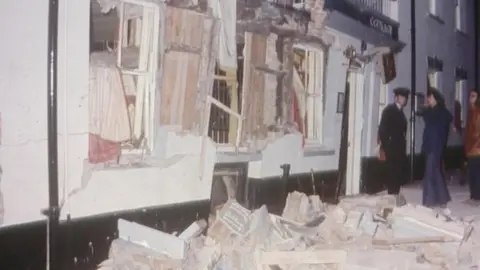 BBC
BBCLawyers involved in the reopened Birmingham pub bombings inquest are considering requesting the same to happen over IRA blasts in Guildford.
KRW Law has argued the inquests never closed because the convictions of the Guildford Four were later proved to be unsafe and overturned.
The BBC has viewed coroner's papers held in Surrey.
They show there was just one opening hearing after the bombings in 1974 in which five people were killed.
Soldiers Ann Hamilton, 19, Caroline Slater, 18, William Forsyth, 18, and John Hunter, 17, died following the blast at the Horse & Groom on 5 October 1974, along with plasterer Paul Craig, 21.
The BBC is in contact with the victims' families and friends, but most remain too traumatised to talk publicly.
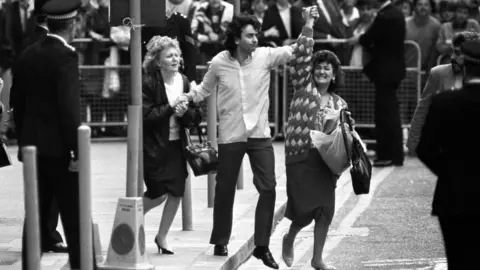 PA
PAChristopher Stanley, from KRW, said there were obvious parallels between the Guildford and Birmingham cases.
Inquests into the Birmingham pub bombing deaths were reopened last year by coroner Louise Hunt, who said "a wealth of evidence" had not been heard.
Mr Stanley believes there may be "sufficient grounds" to satisfy the public interest in applying to the Surrey coroner or the Attorney General to resume the Guildford proceedings.
"This would be on the basis that the original inquests were never closed because convictions were secured against the Guildford Four, which were then proved to be unsafe and unsatisfactory," he said.
"There has never, therefore, been an independent investigation into the Guildford pub bombings and a resumed inquest would be a mechanism to investigate in a manner compliant with human rights standards should there be evidence of state failure or collusion."
A spokeswoman for the Attorney General's Office said they had not received an application.
She said: "If an application is received we will consider it carefully."

Guildford Four timeline
- 5 October 1974 - IRA bombs explode in two pubs in Guildford, Surrey, killing five people and injuring scores more. Guildford was known as a "garrison town", with several barracks nearby, at Stoughton and Pirbright and Aldershot in Hampshire, and a night-life that was popular with the 6,000 military personnel in the area
- 22 October 1975 - Paul Hill, Gerry Conlon, Patrick Armstrong and Carole Richardson - the Guildford Four - jailed for life at the Old Bailey
- 19 October 1989 - After years of campaigning, the Court of Appeal quashes the convictions, ruling them as unsafe, and releases them
- 9 February 2005 - Prime Minister Tony Blair formally apologises to the Guildford Four for the miscarriage of justice they suffered

Although there is no active police investigation into the Guildford bombings, Kevin Winters, senior partner at KRW, thinks there may be a duty to continue to investigate.
He said the "Balcombe Street gang", an IRA unit which carried out a series of bombings in the 1970s, later admitted planting the Guildford bombs but police did not follow up the confessions.
Over the years it has been disputed how many members were in the unit - a court transcript suggested up to 20.
Mr Winters said: "The failure to follow up the Balcombe Street cell confession given to Lord Peter Imbert could lead to the Crown Prosecution Service recommending a fresh investigation, parallel to any resumed inquest."
Surrey Police have said the five-year-long probe by former judge Sir John May after the convictions were quashed addressed the issue of the IRA unit's admissions.
Sir John concluded in his final report - published in 1994 - the police investigation was "thorough".
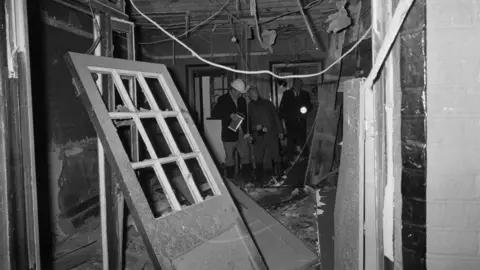 Getty Images
Getty Images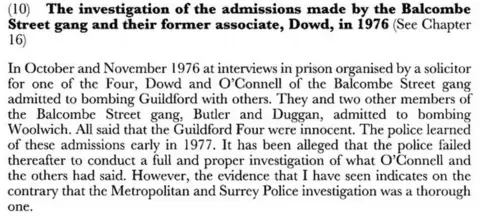 Gov.uk
Gov.ukA force spokeswoman said: "The bombings were not subject to further active investigation by Surrey Police following the publication of the report and, to date, this remains the case."
Lord Imbert, former Surrey assistant chief constable and later Met Police commissioner, who investigated the Balcombe Street gang, gave evidence to Sir John about the Balcombe Street unit's admissions during the inquiry.
Transcripts have shown he told inquiry members: "We had some grave doubts about the veracity of what they were telling us. We were just not sure that they were telling us the truth."
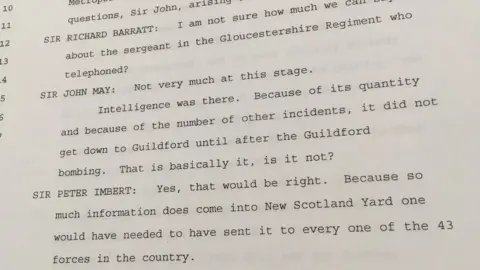 National Archives
National Archives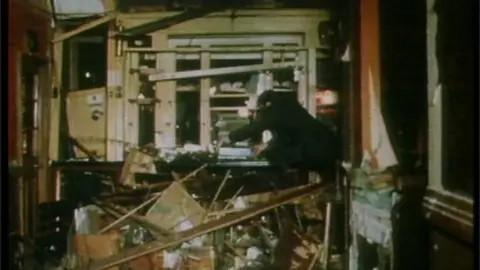
Records from the Surrey coroner's archives show the cause of death for the five pub bombing victims as "blast injuries".
The papers, which reveal the extent of their injuries, show four people died before reaching hospital, but one of the soldiers made it to casualty alive.
Eleven days after the explosions, lawyers for Mr Craig's family wrote to the coroner to ask when inquest proceedings would take place.
The then Surrey coroner Lt Col George Murdoch McEwan replied proceedings had been adjourned and a further hearing was planned, but archives show no sign of any further proceedings.
More than a year after the explosions, Old Bailey staff wrote to the coroner informing him Gerry Conlon, Paddy Armstrong, Paul Hill and Carole Richardson had been convicted of murder.
But those convictions were later deemed unsafe and were overturned after the four spent 15 years in jail.
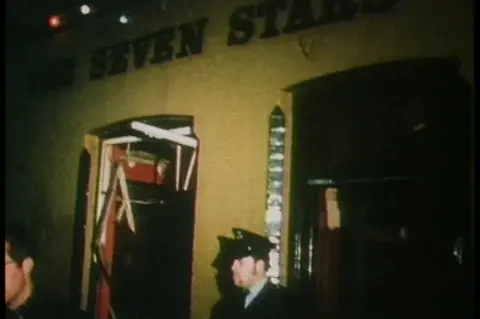
Alastair Logan, who represented the Guildford Four during their legal fight and remains in contact with the two surviving members - Mr Armstrong and Mr Hill - said: "There should never be an inquest that has not concluded.
"It is incredibly important for those who lost loved ones and also who were injured in those explosions. It is important to bring it to a conclusion."
He added: "The defendants would have wanted the inquest completed. Throughout the time I represented them, they were concerned about the people left in limbo after they were convicted."
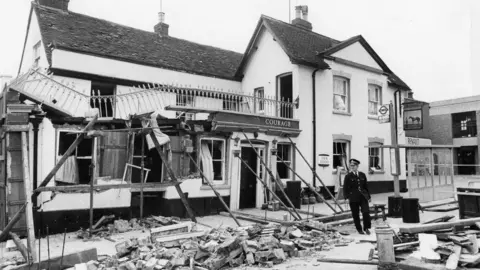 Getty Images
Getty ImagesJulie Hambleton, from Justice 4 the 21, which represents relatives of the Birmingham bombing victims, said the families of those who died in Guildford could contact the group for support.
"We are here if we can help in any way," she said.
"I can't say how they will feel other than they are still grieving and in pain at the loss of their loved ones, which will be with them until the day they die. Murder is murder."
She said the Birmingham families had fought not only for funds but also for emotional support, adding: "There was no counselling in 1974. We had no help from anybody."
IRA blasts that year ended in the wrongful convictions of the Guildford Four, the Birmingham Six, the Maguire Seven - and of Judith Ward following the M62 coach bombing in West Yorkshire.
The status of the inquests following the M62 blast, in which 12 people died, is not yet known.

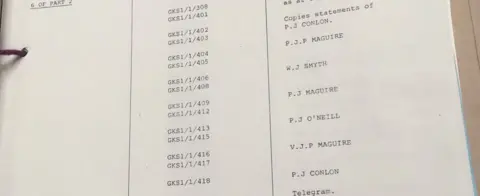 National Archives
National ArchivesPub bombings closed files
Hundreds of files from Sir John May's inquiry remain closed at the National Archives. The BBC accessed working papers last year and has since asked to see more, under FOI. Six files have been released since then, but seven refused.
Papers released include an academic report on false confessions, two indexes of Metropolitan Police papers on the IRA's Balcombe Street unit, and three files from the Royal Commission on Criminal Justice.
Documents that are to remain closed include two files on Gerry Conlon's alibi, Mr Conlon's first defence file, an index of Surrey Police papers, a file headed "allegations of brutality and threats made against the Guildford Four" and another file believed to contain statements made by Mr Conlon's father on the night of his arrest.
The BBC has also asked to see documents relating to the inquiry conducted by Avon and Somerset police into Surrey Police.
However, that final report at the National Archives is to remain closed and Avon and Somerset police have said "no information is held".
The Home Office has said the files have a review date of 2019, and should be available to the public by 2020, subject to any exemptions applied under the Freedom of Information Act (FOI).

